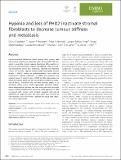Hypoxia and loss of PHD2 inactivate stromal fibroblasts to decrease tumour stiffness and metastasis
Author(s)
Madsen, Chris D.; Pedersen, Jesper T.; Venning, Freja A.; Singh, Lukram B.; Moeendarbary, Emad; Charras, Guillaume; Cox, Thomas R.; Sahai, Erik; Erler, Janine T.; ... Show more Show less
Download44319_2015_Article_BFEMBR201540107.pdf (2.286Mb)
Publisher with Creative Commons License
Publisher with Creative Commons License
Creative Commons Attribution
Terms of use
Metadata
Show full item recordAbstract
Cancer‐associated fibroblasts (CAFs) interact with tumour cells and promote growth and metastasis. Here, we show that CAF activation is reversible: chronic hypoxia deactivates CAFs, resulting in the loss of contractile force, reduced remodelling of the surrounding extracellular matrix and, ultimately, impaired CAF‐mediated cancer cell invasion. Hypoxia inhibits prolyl hydroxylase domain protein 2 (PHD2), leading to hypoxia‐inducible factor (HIF)‐1α stabilisation, reduced expression of αSMA and periostin, and reduced myosin II activity. Loss of PHD2 in CAFs phenocopies the effects of hypoxia, which can be prevented by simultaneous depletion of HIF‐1α. Treatment with the PHD inhibitor DMOG in an orthotopic breast cancer model significantly decreases spontaneous metastases to the lungs and liver, associated with decreased tumour stiffness and fibroblast activation. PHD2 depletion in CAFs co‐injected with tumour cells similarly prevents CAF‐induced metastasis to lungs and liver. Our data argue that reversion of CAFs towards a less active state is possible and could have important clinical implications.
Date issued
2015-08-31Department
Massachusetts Institute of Technology. Department of Biological EngineeringJournal
Embo Reports
Publisher
Nature Publishing Group UK
Citation
EMBO rep (2015)16: 1394 - 1408
Version: Final published version